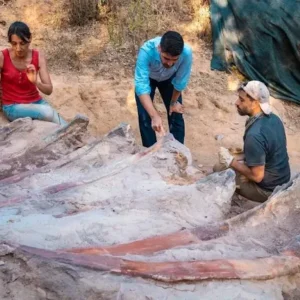The discovery of a 19th-century shipwreck off the coast has sparked a wave of intrigue and excitement among historians and archaeologists. This sunken vessel, lying undisturbed for over a century, holds secrets and stories that promise to shed new light on maritime history and the lives of those who sailed the high seas during that era
The ship, believed to be a merchant vessel from the mid-1800s, was found by a team of underwater archaeologists using advanced sonar technology. The wreckage, remarkably well-preserved despite its long submersion, offers a unique glimpse into a bygone age of exploration and trade

Initial explorations of the wreck have uncovered a trove of artifacts that paint a vivid picture of life aboard the ship. Items such as navigation instruments, personal belongings of the crew, and cargo remnants provide invaluable insights into the daily routines, challenges, and experiences of 19th-century sailors. Among the most fascinating finds are letters and journals that have miraculously survived the depths, offering first-hand accounts of the voyage and its unfortunate end.
The ship’s final journey remains shrouded in mystery. Historical records are sparse, and the reasons behind its sinking are still unclear. However, researchers are meticulously piecing together clues from the wreckage and the recovered documents to reconstruct the ship’s story. The evidence suggests that the vessel encountered a severe storm, which may have led to its demise. The exact location and condition of the wreck indicate that the crew fought valiantly to save the ship, adding a poignant human element to the historical
One of the most intriguing aspects of this discovery is the cargo the ship was carrying. Early indications point to a variety of goods, including exotic spices, textiles, and precious metals, which highlight the vessel’s role in the global trade networks of the 19th century. These findings not only enhance our understanding of trade routes and economic exchanges of the period but also underscore the perilous nature of maritime commerce.

The uncovering of this shipwreck has broader implications for historical research. It challenges previously held notions about maritime navigation, shipbuilding techniques, and the resilience of seafarers during the 19th century. Each artifact and fragment recovered from the wreck serves as a tangible link to the past, offering a deeper appreciation for the ingenuity and courage of those who ventured into uncharted waters.
As the investigation continues, the shipwreck promises to yield even more secrets. Ongoing excavation efforts are expected to reveal additional artifacts and clues, further enriching the untold saga of this ill-fated voyage. The preservation and study of these findings will undoubtedly contribute to a more comprehensive understanding of maritime history and the enduring spirit of exploration.
In conclusion, the discovery of the 19th-century shipwreck is a significant milestone in archaeological research. It unravels a captivating story of adventure, commerce, and tragedy that has remained hidden beneath the waves for over a century. As we delve deeper into the mysteries of this sunken vessel, we gain not only a better understanding of our maritime heritage but also a profound respect for the men and women who braved the seas in pursuit






